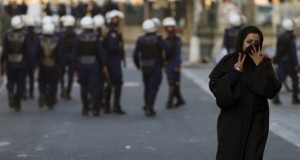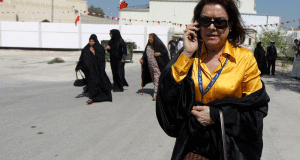Falling government revenues are pushing Bahrain’s government to implement economic reforms, but it will need to make political concessions to pursue long-term changes.
April 1, Bahrain raised the price of natural gas for industrial use by $0.25 per million British thermal units (mmBTU), in addition to a 25 percent hike for the cost of gasoline sold to boats at private marinas. This is the first fuel price hike since 1983 and may gradually extend to the wider population as the government tries to lessen the cost of its energy subsidies. Although Bahrain’s government revenues are expected to drop by about one-third this year due to the low price of oil, this may well be an opportunity for the state to push for much-needed structural reforms in the energy sector, cutting fuel subsidies and introducing limited taxes.
Much like its Gulf Cooperation Council (GCC) counterparts, Bahrain provides a variety of economic benefits to its citizens in the form of public sector employment, social welfare, and subsidies on goods and services. Such channels and mechanisms for the distribution of oil revenue are crucial to ensuring political stability and allegiance to the regime. However, with the remarkable economic growth rates and population boom of the past decade, increasing domestic consumption is straining the state’s capability to provide infrastructure, housing, and subsidies. The amount spent on the security sector—which forms the largest share of Bahrain’s budget—is also poised to expand as the government continues to curb popular unrest.
To address these challenges, Bahrain has opted to reach for the lowest-hanging fruit by curtailing fuel subsidies. Other more far-reaching forms of recurrent expenditure, such as public sector wages and government services, are more politically binding. In 2013, it is estimated that Bahrain spent about one-third of its state budget (or 9 percent of GDP) on food, fuel, and utility subsidies. These subsidies are unsustainable at a time when public debt is expected to surpass 50 percent of GDP this year. Currently, fuel subsidy cuts are directed at industrial users and thus the social impact is minimal, but cutting subsidies to individual consumers and households will carry a substantial political risk. One possible alternative to the current universal subsidy program is to adopt a system of direct transfers to low income segments, for example as applied in India.
Bahrain’s government revenues, on the other hand, depend to a large extent on global energy markets. In 2013, 88 percent of state income came from crude and refined oil exports, three-quarters of which were from the offshore Abu Safa field, shared with and controlled by Saudi Arabia. Dwindling oil prices will reduce government revenues considerably, but the broader effects on economic growth should be mild, as Bahrain’s oil sector is the smallest in the region and constitutes around 26 percent of GDP. Not only does oil represent 75 percent of all exports, but it also constitutes about half of all imports because Bahrain purchases crude oil for refinement at market price from Saudi Arabia. The recent fall in prices will reduce both the export and import bill, so the net effect on trade should be minimal.
Though GDP growth in recent years has been mainly driven by non-oil sectors such as manufacturing and retail, Bahrain’s tax policy is still in its infancy, and this growth is not reflected in state finances. The reliance on oil income is exacerbated by diminished government revenues from non-oil sources—a result of trade liberalization and the privatization of certain government services. There is urgent need for the state to seek and pursue alternative sources of income through taxes and fees. The GCC economies have discussed implementing value-added taxes (VAT) across the region, and declining oil revenues present an opportunity to muster political backing for the project.
Value-added taxes can be designed effectively and introduced at low levels to minimize the negative impact on socially vulnerable groups. For example, food and essential goods can be exempt while higher tax rates would apply to luxury goods and excess consumption. Moreover, Bahrain is reassessing the fees charged on certain government services, for example adding a healthcare cost of 72 dinars ($190) per year on foreign residents’ visa fees. Though raising fees on the expatriate population is more politically acceptable at the moment, fees on providing services to nationals should gradually be increased as well. Bahrain and other Gulf economies have historically been averse to levying taxes and fees, which prevents these countries from reaping the benefits of their economic diversification.
The current parliament is avidly pro-government, as opposition societies have boycotted the most recent elections. Therefore the state will find it easy to pass unpopular legislation in the short term. In the long run, however, subsidy cuts and tax policy reforms will require the support and backing of broader segments of society. The success of economic reforms hinges on the political climate and the social contract between the state and its citizens.
The country was able to implement similar politically risky projects before. In 2008, Bahrain introduced taxes on businesses employing foreign workers, aiming to reduce the wage gap and encourage the private sector to hire nationals. The fees collected were allocated to the state budget and used to train Bahrainis for high value-added jobs. At the time, conservative elements of the regime and the business community fought vehemently against imposing the tax. But the changes were approved, as al-Wefaq, the largest opposition society, backed the strategies developed by the Crown Prince and Economic Development Board. The government was willing to work with opposition movements and made it obvious how the tax revenue will be spent to benefit the local working class—and future reforms should adhere to a similar framework. However, the labor tax was suspended in 2011 (and reinstated two years later at much lower levels) as a way for the regime to punish al-Wefaq and its supporters while strengthening its position among business and expatriate circles.
Cutting subsidies and enforcing taxes will require the state to extend some forms of representation and public participation in policymaking. As it stands, however, the state’s control over civil society is tightening, and political opposition societies are facing a public backlash following their decision to stay out of the parliamentary process. The regime should instead recognize that it needs to offer political concessions in order for economic reforms to emerge in the coming few years.
As Bahrain heads for a sizeable fiscal deficit in 2015, the state can capitalize on the decline of oil prices by cutting wasteful spending on subsidies and increasing revenues through taxes and fees. This will require the government to make swift and decisive economic reforms in the coming months. In the long term, Bahrain needs to address the fiscal sustainability of its current social contract through meaningful political discourse.
Abdulla Abdulaal is a PhD candidate at the School of Oriental and African Studies. His research interests include the economic history and political economy of the Arab Gulf states.
This article has been republished from Carnegie Endowment for International Peace’s website.
The views expressed in this article are the author’s own and do not reflect that of the Bahrain Debate’s organising body.




